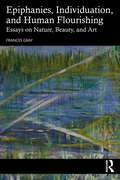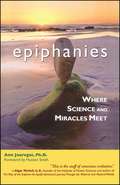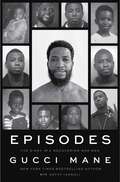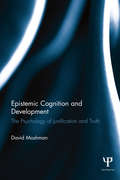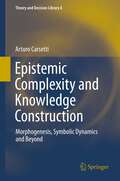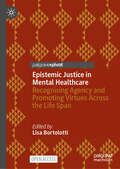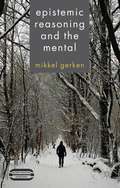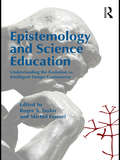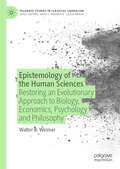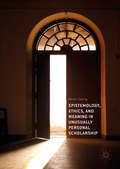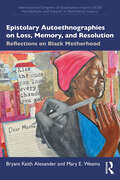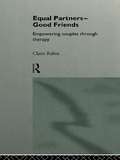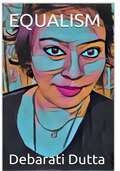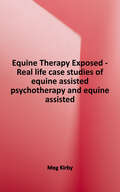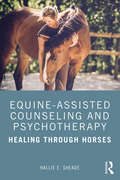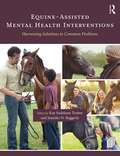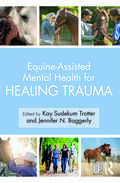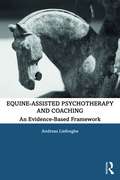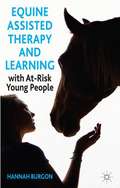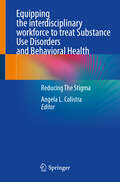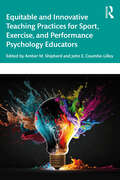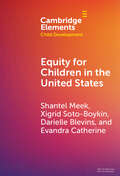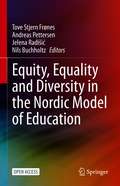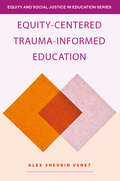- Table View
- List View
Epiphanies, Individuation, and Human Flourishing: Essays on Nature, Beauty, and Art
by Frances GrayWithin this book, Gray argues that moments of profound existential importance are given to us in the presence of Art, and that such moments are important motivators in our personal, civic, and moral lives. Using the work of Jung, Freud, Berger, and Nussbaum, this book looks to Art in its theory and practice as a driver of psychic epiphany. Examining music, environment, architecture, poetry, and painting, it traces the relationship between the ordinary and the extraordinary, showing how we can and do locate ourselves beyond our own psyches in a world of artistic endeavour. Gray concludes that Art plays a critical role in psychological practice and human flourishing on an individual and collective level. Epiphanies, Individuation, and Human Flourishing will appeal to artists, art theorists, therapists, and analysts as a teaching tool that demonstrates the possible connections that can be made among the arts, sciences and psycho-therapeutic communities, and Nature.
Epiphanies: Where Science and Miracles Meet
by Huston Smith Ann JaureguiIn a quiet moment of therapy, a breakthrough comes -- the miracle of the new. To experience an epiphany is to have sudden insight into the essential meaning of something, unleashed sometimes in exquisitely slow motion, sometimes in a flash. In an intimate, lyrical integration of the science of psychology and transcendence of spirituality, celebrated clinician Dr. Ann Jauregui introduces us to nine individuals who have undergone astonishing transformations by exploring a world quite different from the one described by our five senses. With moments of miraculous and joyful surprise, Epiphanies exposes a reality outside of everyday existence that has momentous implications for life's ultimate questions. "Shyly we venture out with these stories," Dr. Jauregui writes, "into a world where science itself is struggling to describe a realm out of time and space and language." We are the beneficiaries of these extraordinary shifts of perspective, invited into a sparkling conversation that allows us to see the potential residing in all of us.
Episodes: The Diary of a Recovering Mad Man
by Gucci ManeGucci Mane, one of hip-hop&’s most iconic figures and a trailblazer in Atlanta&’s rap culture, reveals his struggles with mental health and drug addiction that will provide fans and readers with insights into his career and life.As one of hip-hop&’s legendary figures and an indispensable fixture in Atlanta&’s vibrant rap culture, Gucci was on an upswing in his career when he sold his debut memoir, The Autobiography of Gucci Mane in 2016. He had just been released from prison, sporting a slimmer physique and health-conscious diet; he announced his ninth album, the platinum-selling Everybody Looking; and became the face of a global campaign with the luxury Italian designer that inspired his name and persona. But underneath all that, he was hiding some of his darkest struggles from the world. Now he is ready to tell his full story. In Episodes, Gucci revisits his life and shares what was really going on for the first time. The mental anguish, the pitfalls, the triggers no one speaks about. Each episode is Gucci experiencing something—something you may remember from the news or even heard in his music—and giving you the background of where he was mentally. He reveals how his fascination with money got the worst of him, why he committed certain crimes, the story behind his ice cream cone tattoo, and how his wife felt watching him overdose. Along the way, he interviews medical professionals and mental health experts to provide insight into mental health awareness. Episodes is Gucci&’s way of reaching beyond the &“each one, teach one&” approach of discussing mental illness behind closed doors, opting instead to cultivate a discourse amongst a culture that, while steadily improving how it regards mental health, still stigmatizes public discussions around the topic. This compelling memoir sheds light on both his inner struggles and his triumphs, offering an unflinching account of a man who defied the odds to leave a lasting legacy on music, culture, and conversations around mental health.
Epistemic Cognition and Development: The Psychology of Justification and Truth
by David MoshmanEpistemic cognition, the philosophical core of metacognition, concerns people’s knowledge about the justification and truth of beliefs. Multiple literatures in psychology and education address aspects of epistemic cognition. In the absence of a coherent conceptual framework, however, these literatures mostly fail to communicate with each other and often connect only loosely to genuine epistemology. This complicates any effort to achieve a systematic theoretical understanding of epistemic cognition and its development. Deanna Kuhn writes in her foreword, "Moshman is not the first to take on this challenge, but he fulfills it elegantly and, I think, the most comprehensively and astutely." After reviewing the basics of philosophical epistemology and cognitive psychology, Epistemic Cognition and Development provides a compelling account of developmental change across childhood and beyond in knowledge about knowledge, especially with regard to fundamental conceptions of objectivity, subjectivity, rationality, justification, and truth. This is followed by detailed consideration of domain-specific epistemologies of science, logic, morality, social convention, history, and identity, including associated forms of reasoning. The final section provides theoretical conclusions, educational and social applications, and suggestions for further research.
Epistemic Complexity and Knowledge Construction
by A. CarsettiThe volume as its first target aims at clarifying that peculiar entanglement of complexity, causality, meaning, emergence and intentionality that characterises the unfolding of the "natural forms" of human cognition As is well known, cognition is not only a self-organising process. It is also a co-operative and coupled process. If we consider the external environment as a complex, multiple and stratified Source which interacts with the nervous system, we can easily realise that the cognitive activities devoted to the "intelligent" search for the depth information living in the Source, may determine the very change of the complexity conditions according to which the Source progressively expresses its "wild" action. In this sense, simulation models are not neutral or purely speculative: the true cognition actually appears to be necessarily connected with successful forms of reading, those forms, in particular, that permit a specific coherent unfolding of the deep information content of the Source. Therefore, the simulation models, if valid, materialise as "creative" channels, i.e., as autonomous functional systems, as the very roots of a new possible development of the entire system represented by mind and its Reality. From a general point of view, the objectivity of Reality is also proportionate to the autonomy reached by cognitive processes. In this sense, at the level of cultural evolution, reference procedures act as guide, mirror and canalisation with respect to primary information flows and involved selective forces: they offer themselves as the actual instruments for the constant renewal of the code, for the invention and the actual articulation of an ever-new incompressibility. From an effective point of view, they appear as indissolubly linked to the successive definition of specific (and innovative) measures of the epistemic complexity. These measures cannot concern only statistical rarity (Shannon) or computational incompressibility (Kolmogorov-Chaitin), on the contrary they should also be able to take into account the coupled connection between the Source and the cognitive agent, the evolution of this connection as well as the successive constitution of meaning as symbolic form. Hence the possible (and necessary) definition of new axiomatic systems, new measure spaces, the real displaying of processes of continuous reorganisation at the semantic level. Indeed, it is only through a complete, first-order "reduction" and a correlated non-standard second-order analysis that new incompressibility will actually manifest itself. Therefore, the reference procedures appear to be related to a process of multiplication of minds, as well as to a process of "clarification" of meanings which finally emerges as vision via principles.
Epistemic Justice in Mental Healthcare: Recognising Agency and Promoting Virtues Across the Life Span
by Lisa BortolottiThis open access book explores epistemic justice in mental healthcare, bringing together perspectives from psychologists, psychiatrists, philosophers, activists, and lived experience researchers. Through eight chapters, authors identify threats to the agency of people who hear voices, experience depression, have psychotic symptoms, live with dementia, are diagnosed with personality disorders, and face serious mental health issues while receiving palliative care. Considering the power asymmetries in clinical interactions, where patients are vulnerable and healthcare professionals are uniquely placed to offer support, this book reaffirms the importance of recognizing patients as agents and collaborators. Topics covered include trust in the therapeutic relationship, dignity at the end of life, the social dimension of health, stigma in an acute ward, the harm caused by biases and stereotypes, the role of clinical communication, and the promise of digital health. Students, academic researchers, practitioners, as well as mental health charities will benefit from this timely collection.
Epistemic Reasoning And The Mental
by Mikkel GerkenEpistemic Reasoning and the Mental integrates the epistemology of reasoning and philosophy of mind. The book contains introductions to basic concepts in the epistemology of inference and to important aspects of the philosophy of mind. By examining the fundamental competencies involved in reasoning, Gerken argues that reasoning's epistemic force depends on the external environment in ways that are both surprising and epistemologically important. For example, Gerken argues that purportedly deductive reasoning that exhibits the fallacy of equivocation may nevertheless transmit epistemic warrant from its premise-beliefs to its conclusion-belief. This view is contrary to orthodoxy according to which such reasoning must be valid. But Gerken shows how this novel and unorthodox view is integrated in a psychologically plausible account of our reasoning competencies and a general epistemological framework. What emerges is an approach to the philosophy of reasoning that is informed and constrained by both epistemology and philosophy of mind.
Epistemology and Science Education: Understanding the Evolution vs. Intelligent Design Controversy
by Michel Ferrari Roger S. TaylorHow is epistemology related to the issue of teaching science and evolution in the schools? Addressing a flashpoint issue in our schools today, this book explores core epistemological differences between proponents of intelligent design and evolutionary scientists, as well as the critical role of epistemological beliefs in learning science. Preeminent scholars in these areas report empirical research and/or make a theoretical contribution, with a particular emphasis on the controversy over whether intelligent design deserves to be considered a science alongside Darwinian evolution. This pioneering book coordinates and provides a complete picture of the intersections in the study of evolution, epistemology, and science education, in order to allow a deeper understanding of the intelligent design vs. evolution controversy. This is a very timely book for teachers and policy makers who are wrestling with issues of how to teach biology and evolution within a cultural context in which intelligent design has been and is likely to remain a challenge for the foreseeable future.
Epistemology of the Human Sciences: Restoring an Evolutionary Approach to Biology, Economics, Psychology and Philosophy (Palgrave Studies in Classical Liberalism)
by Walter B. WeimerThis book argues for evolutionary epistemology and distinguishing functionality from physicality in the social sciences. It explores the implications for this approach to understanding in biology, economics, psychology and political science. Presenting a comprehensive overview of philosophical topics in the social sciences, the book emphasizes how all human cognition and behavior is characterized by functionality and complexity, and thus cannot be explained by the point predictions and exact laws found in the physical sciences. Realms of functional complexity – such as the market order in economics, the social rules of conduct, and the human CNS – require a focus on explanations of the principles involved rather than predicting exact outcomes. This requires study of the historical context to understand behavior and cognition. This approach notes that functional complexity is central to classical liberal ideas such as division of labour and knowledge, and how this is a far more powerful and adequate account of social organization than central planning. Through comparison of these approaches, as well as its interdisciplinary scope, this book will interest both academics and students in philosophy, biology, economics, psychology and all other social sciences.
Epistemology, Ethics, and Meaning in Unusually Personal Scholarship
by Amber EspingThis book uses Viktor Frankl’s Existential Psychology (logotherapy) to explore the ways some professors use unusually personal scholarship to discover meaning in personal adversity. A psychiatrist imprisoned for three years in Nazi concentration camps, Frankl believed the search for meaning is a powerful motivator, and that its discovery can be profoundly therapeutic. Part I begins with four stories of professors finding meaning. Using the case studies as a foundation, Part II investigates issues of epistemology and ethics in unusually personal research from an existential perspective. The book offers advice for graduate students and faculty who want to live and work more meaningfully in the academy.
Epistolary Autoethnographies on Loss, Memory, and Resolution: Reflections on Black Motherhood (International Congress of Qualitative Inquiry (ICQI) Foundations and Futures in Qualitative Inquiry)
by Bryant Keith Alexander Mary E. WeemsThis book uses letter writing as a form of engaging autoethnography to address relational histories and dynamics such as race, gender, loss, memory and resolution.It is structured around textual performances, poems, and dialogues in the form of letters. Set within the context of adult Black children and their Black mothers, each author uses their letters to reflect on life with and without mama, and their own sense of coming to know themselves in the absence of their mother. Each entry evidence encounters of pain, possibility, and potentiality collated between the authors for a robust thematic underpinning for the reader. Building upon poetic inquiry and autoethnography narratives, this book seeks to build arguments about privatized struggle, and offers a guide on reflection.In addition to students and researchers partaking in autoethnographical studies, this book is suitable for anyone studying qualitative inquiry, performance studies, gender studies, cultural studies, Black studies, anthropology, and performative writing.
Epistolary Constructions of Post-World War I Identity: The Invisibility of Minority Groups
by Manel HeratThis book analyses the letters of marginalised groups of World War I soldiers - including Black, Indian and disabled ex-servicemen - from a linguistic perspective, looking at issues such as descriptions of disability, identity and migration, dealing with minority groups who have long been rendered invisible, and exploring how these writers position themselves in relation to the 'other'. The author makes use of a corpus-assisted approach to examine identity construction and performance, shedding light on a previously under-explored demographic. This book will be of interest to students and scholars of World War I history, language and identity, psychological and physical disability, as well as readers seeking a fresh angle on a key period of 20th century history.
Equal Partners - Good Friends: Empowering Couples Through Therapy
by Claire RabinMarriage as an equal partnership is the goal of amny couples in the western world today and yet equality is often limited by the ways that power and gender interact in the relationship, leading to dissatisfaction and ultimately the break up of the marriage. In Equal PArtners - Good Friends Claire Rabin examines the connection between inequality in marriage and marital distress. Drawing on extensive research and personal interviews in the UK, USA and Israel, she stresses the role of friendship in establishing a truly equal relationship. Focusing on issues of gender, sex roles and power, she provides a new clinical treatment model for therapists working with couples which is much needed in today's climate of change.
Equalism
by Debarati DuttaHUMANITY IS THE FIRST THING.. READ AND THINK, MOTIVATE POSITIVELY, FAULT LIES IN THE BASIC CAUSE, WHICH CAUSE DEPRESSION, UNHAPPINES, ILL MENTAL HEALTH . ELEMINATE IT AND LIVE HAPPY..
Equine Therapy Exposed: Real life case studies of equine assisted psychotherapy and equine assisted learning with everyday people and horses
by Meggin KirbyIn this book, you will get a sneak peek and deep dive into the emerging professional practice of equine-assisted therapy. This unique, beautifully presented, and engaging book provides real-life case studies with diverse clients and delivers insight from one of Australia's leading education experts in Equine Assisted Psychotherapy and Animal Assisted Psychotherapy. Meg Kirby (BA, MASW, DIP. GESTALT THERAPY) is a Mental Health Social Worker of 25 years, and international education expert in equine assisted psychotherapy, author, founder, senior trainer, and supervisor at The Equine Psychotherapy Institute. When Meg is not training students from all across the globe in equine, animal, and nature-assisted psychotherapy, she spends her time caring for 12 family herd members, three cats, dog "Bear," and rabbit, Darcy... not forgetting her loving husband and two beautiful daughters, Rose and Jasmine. Meg lives and breathes the wisdom of animals and nature.
Equine-Assisted Counseling and Psychotherapy: Healing Through Horses
by Hallie E. SheadeEquine-Assisted Counseling and Psychotherapy offers a comprehensive guide to the practice of working with equines in a psychotherapeutic setting. Chapters provide a research-informed approach to integrating the contributions of horses and other equines into mental health services. With a focus on equine welfare, the book uses a relational approach to explore a broad range of topics, including documentation and treatment planning, work with clients across the lifespan and with diverse needs, complexities related to horses in the therapeutic relationship, as well as ethical, legal, and best-practice considerations. Mental health and equine professionals will come away from the book with a strong understanding of both the theoretical and practical aspects of equine-assisted counseling.
Equine-Assisted Mental Health Interventions: Harnessing Solutions to Common Problems
by Kay Sudekum Trotter Jennifer N. BaggerlyWritten by internationally renowned equine-assisted mental health professionals, this edited collection teaches counselors how to design and implement equine-assisted mental health interventions for different populations and various challenges. Supported by ethical considerations and theoretical frameworks, chapters cover common issues including depression, anxiety, grief, ADHD, autism, eating disorders, substance abuse, self-esteem, social skills and communication, couples and family work, and professional development. Each chapter provides practical tips for implementing treatment strategies, case studies with transcript analyses, and sample session notes. This book will appeal to both the expert equine-assisted mental health counselor and the seasoned counselor who is open to partnering with an equine practitioner to help their clients in new and innovative ways.
Equine-Assisted Mental Health for Healing Trauma
by Kay Sudekum Trotter Jennifer N. BaggerlyClinicians have long recognized that trauma therapy provides a pathway to recovery, and Equine-Assisted Mental Health for Healing Trauma provides that pathway for those who work with horses and clients together. This book demonstrates a range of equine-assisted mental health approaches and step-by-step strategies for facilitating recovery from trauma for children, adults, and families. Chapters address topics such as chronic childhood trauma, accident-related trauma, complex trauma and dissociation, posttraumatic growth in combat veterans, somatic experiencing and attachment, eye movement desensitization and reprocessing (EMDR), reactive attachment disorder (RAD), relational trauma, and sexual trauma. Experts also provide case studies accompanied by transcript analyses to demonstrate the process of trauma healing. Clinicians will come away from the book with a wealth of theoretical and practical skills and an in-depth, trauma-informed understanding that they can use directly in their work with clients.
Equine-Assisted Psychotherapy and Coaching: An Evidence-Based Framework
by Andreas LiefoogheBased on over a decade of sustained longitudinal research with a broad range of different user groups, Equine-Assisted Psychotherapy and Coaching: An Evidence-Based Framework is an essential guide which offers both theoretical foundations and practical models for working with horses in psychotherapy and coaching. While not a panacea for distress and difficulties, the connections that humans find with horses can become a catalyst for deeper self-knowledge. By de-centring the human subject and placing the horse in the middle of the investigation, the ways in which humans make sense of themselves can be explored and more easily understood. Drawing on this wide spectrum of different client groups, the book features intervention studies with expelled teenagers, adults in addiction recovery programmes, children diagnosed on the autistic spectrum, people suffering from trauma and mental health problems, prisoners and even multi-national corporations wanting culture change. The practice of using horses in a psychological intervention is thoroughly scrutinised throughout, with ways of establishing successful change documented and assessed. Liefooghe’s analysis of these studies builds up to provide a comprehensive, evidence-based framework for equine-assisted psychotherapy and coaching. This essential book offers psychotherapists, coaches and all those who work in a helping capacity a clear insight into what horses can and cannot do in a therapeutic role.
Equine-Assisted Therapy and Learning with At-Risk Young People
by Hannah Louise BurgonThis book provides an overview of the field of Equine-Assisted Therapy and Learning and gives a powerful account of a research study charting the experiences of seven 'at-risk' young people attending a pioneering Therapeutic Horsemanship centre in the UK. The book includes a foreword from Leif Hallberg, author of Walking the Way of the Horse .
Equipping the interdisciplinary workforce to treat Substance Use Disorders and Behavioral Health: Reducing The Stigma
by Angela L. ColistraThe U.S. faces a critical crisis in behavioral health and addiction care. Overburdened emergency rooms and primary care offices struggle with lengthy wait times, while workforce shortages and systemic barriers disproportionately impact marginalized communities. This has resulted in the criminal justice system becoming a de facto provider of mental health and addiction services. In 2024, Surgeon General Dr. Vivek Murthy declared a national epidemic of loneliness and isolation, exacerbated by the COVID-19 and opioid crises. His advisory underscores the importance of social connection, empathy, and belonging as vital components of well-being. Despite the urgent need, stigma surrounding mental health and substance use disorders persists, hindering access to care. Historically, training programs have underemphasized addiction and behavioral health education across medical and behavioral health disciplines. This book serves as a vital resource for interdisciplinary teams, highlighting the crucial role each profession plays in improving access to addiction and mental health care and reducing stigma. It advocates for a collaborative, relationship-centered approach, equipping clinicians and peers with the knowledge and skills to effectively address addiction and behavioral health within communities. Expertly written and reviewed, it offers up-to-date scientific and clinical information spanning a broad range of relevant topics.
Equitable and Innovative Teaching Practices for Sport, Exercise, and Performance Psychology Educators
by Amber M Shipherd Coumbe-Lilley, John EEquitable and Innovative Teaching Practices for Sport, Exercise, and Performance Psychology Educators addresses the need for a resource on practical learning and assessment activities for face-to-face and online instruction in sport, exercise, and performance psychology. Specifically, this book provides readers with evidence-based strategies for addressing classroom challenges, namely those that the COVID-19 pandemic brought to the forefront, including flexible yet equitable teaching practices, student engagement both in and outside of the classroom, building connections in the online or hybrid classroom, and innovative techniques, activities, assessments, and course design approaches. The sport, exercise, and performance psychology field demands that educators help learners translate evidence into practice and recognize relationships between science, application, and reflection. Tomorrow’s learners will require instructional approaches that engage them and increase their awareness, knowledge, and skill development so that their experience is rich, deep, and memorable.Equitable and Innovative Teaching Practices for Sport, Exercise, and Performance Psychology Educators bridges the gap between pre- and post-pandemic teaching and learning practices that provide educators with strategies and tools to equip them for tomorrow’s students and is key reading for graduate students, young professionals, or experienced educators in the field of sport, exercise, and performance psychology. Active professionals in the broader fields of psychology, kinesiology, coaching, counselling, or education who may teach sport, exercise, and performance psychology courses or students will also find this new book a valuable resource.
Equity for Children in the United States (Elements in Child Development)
by Shantel Meek Evandra Catherine Xigrid Soto- Boykin Darielle BlevinsAll children deserve access to the conditions and opportunities they need to thrive, unbiased accessible healthcare and high-quality learning opportunities, safe, toxin free communities and stable housing, access to nutritious meals, and secure, warm, and available caregivers who love them. Historic and contemporary injustices in U.S. society have created inequities in opportunity and access to resources for Black, Latin, Asian, American Indian and Alaska Native, other children of color, or disabilities, poverty, and marginalized. This contributed to disparities across an array of child development outcomes. In this Element, the authors overview inequities in economic, educational, and health systems through historical and contemporary perspectives, and describe how these inequities impact children and families. Also, solutions to address these inequities as to reimagine a fairer U.S. American society, from its youngest residents, where all families have what they need to thrive. This title is also available as Open Access on Cambridge Core.
Equity, Equality and Diversity in the Nordic Model of Education
by Tove Stjern Frønes Andreas Pettersen Jelena Radišić Nils BuchholtzDoes the Nordic model of education still stand by its original principles and safeguard education for all? This Open Access volume is a carefully crafted collection of chapters that investigate the different aspects of equity, equality and diversity across the education systems in the Nordic countries. Based on data from various national and international large-scale assessments, the volume provides a better understanding of both the functions and foundations of the Nordic model, along with how the concepts mentioned above are enacted in practice. Across the chapters, data from different national and international large-scale assessment studies are used for cross- and single-country analyses on a variety of issues related to equity, equality and inequality in diverse educational settings. The investigations address different subject domains (i.e., mathematics, science, reading), age and grade groups, but also issues related to teachers and the schools themselves. In addition to these empirical chapters, the book addresses the theoretical and methodological underpinnings of the ideas and tools embedded in the phenomena of equity and equality and how they have met in the Nordic model of education.
Equity-Centered Trauma-Informed Education (Equity and Social Justice in Education Series)
by Alex Shevrin VenetEducators must both respond to the impact of trauma, and prevent trauma at school. Trauma-informed initiatives tend to focus on the challenging behaviors of students and ascribe them to circumstances that students are facing outside of school. This approach ignores the reality that inequity itself causes trauma, and that schools often heighten inequities when implementing trauma-informed practices that are not based in educational equity. In this fresh look at trauma-informed practice, Alex Shevrin Venet urges educators to shift equity to the center as they consider policies and professional development. Using a framework of six principles for equity-centered trauma-informed education, Venet offers practical action steps that teachers and school leaders can take from any starting point, using the resources and influence at their disposal to make shifts in practice, pedagogy, and policy. Overthrowing inequitable systems is a process, not an overnight change. But transformation is possible when educators work together, and teachers can do more than they realize from within their own classrooms.
